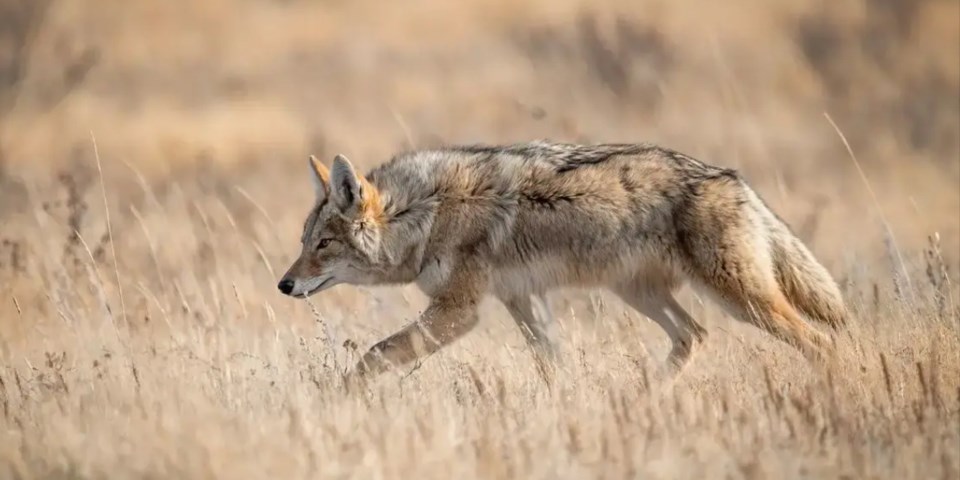BARRHEAD – Coyotes in Barrhead and the surrounding area have been observed coming into people’s yards, attacking a dog in proximity to their house, generally seeing and hearing more coyotes.
Colleen Cassady St. Clair, PhD, Professor at the University of Alberta, has been studying coyotes for the last 15 years.
St. Clair said that one of the reasons coyotes may be increasing their numbers and being bolder is their natural reaction to when coyote groups are killed off.
“If people are shooting coyotes on site that is actually exerting another kind of selective pressure on them,” St Clair said.
“Coyotes' reactions is having larger litters and breeding at younger ages, in other words, they're making more coyotes faster.”
If coyotes were not being hunted, reproduction would be slower, resulting in fewer coyotes in the area, St. Clair said.
“Ironically, if coyotes are constantly being shot, they never do reach carrying capacity, reproducing as if there's an endless frontier,” St. Clair added.
Easy access to food, whether that be livestock, pets, or even bird seed, can also increase coyotes' brazenness.
St. Clair has found that coyotes are eating bird seed.
“I think that's just an example of the kind of opportunism that they have so they eat what's available. We find that they eat a ton of apples in urban areas. Coyotes can eat almost anything,” said St. Clair.
In one animal they studied, researchers found stomach contents of part of a leather glove, a Tim Horton’s muffin wrapper, some gopher claws, some berry seeds and stems and a grocery store apple.
Coyotes can be carriers of toxoplasma, which is usually associated with cats.
“We were speculating that disease might be playing a role in the increased boldness of coyotes,” said St. Clair.
“Animals get infected with the toxoplasma parasite by eating their prey so that's how cats get infected. They eat mice that are already infected.”
Virtually all species of mammals, including humans, can carry toxoplasma and can be affected by increased aggression or have a reactive behaviour change.
“One idea is that the return of wolves is pushing coyotes closer to people an rural areas,” suggested St. Clair, noting wolves eat coyotes.
The number of wolves has been increasing over decades, according to St Clair.
“I think the most common view also thinks that if animals are exhibiting the kind of behaviour that that endangers people or livestock then that has to be dealt with, usually lethally.”
“I think that the majority of people no longer hold that view that all carnivores need to be killed.
That's been a societal shift that's been going on now for decades.”
St. Clair suggested people can hang reflectors on their fences saying anything that reflects light will deter coyotes from entering.
She also suggested coyote rollers for livestock pens.
Coyotes use the top edge of a pen to jump into the pen, and a roller can deter them from getting inside with at-risk livestock or animals.
Joe Prociuk of the Barrhead Fish and Game Association said he gets mixed reports from area residents. Some say coyotes are all over the place and others say they aren’t around.
“The thing is with people don't realize is that they are disease carriers,” stated Prociuk.
“For example, they are susceptible to mange, which is mother nature’s way, I think, of controlling them.”
“In Barrhead and Woodland counties, Alberta residents, with right of access, may hunt (but not trap) coyotes throughout the year on privately-owned land and on occupied crown land (i.e. grazing leases),” explained Laura Vilchis Sanchez, Communications Advisor, Public Safety and Emergency Services, Communications and Public Engagement for the Government of Alberta.
Sanchez suggested that people learn more about hunting regulations on the Fishing, Hunting and Trapping Regulations page on the Alberta.ca website.
If you encounter a coyote or other wildlife that is an imminent public safety concern, please report the incident to the 24-hour Report A Poacher line at 1-800-642-3800.



